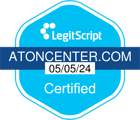There is a treatment that is becoming very popular in treatment for substances. It is called Dialectical Behavior Therapy, or DBT as most people refer to it.
Based on the idea of using the opposing forces of acceptance and change, it is a powerful type of therapy that empowers us to change and gives us specific skills and tools to use going forward to maintain that change. But why is DBT helpful in treatment?
Learning Acceptance
When we have used substances and suffered all of the consequences that come with that usage, it can be difficult for us to accept ourselves and where we are. Before we can make changes and move forward, though, we need to learn to be able to accept ourselves as well as the world around us.
As we learn to accept ourselves and our circumstances exactly as we are, then we can have the perspective that we need to make a change in our lives.
Powerful Change
While acceptance is peaceful, change is dynamic. When we are truly prepared to change, we can be empowered by the peace of acceptance.
This allows us to see where we need to change in our lives, and how to access the tools for that change.
The desire to change is at the core of our recovery process. When we submit ourselves to treatment, we are effectively seeking change for our lives. That change is healing.
We need to be able to heal from past pain and trauma. That is what feeds our continued need for substances.
Once we have accepted and healed from our pain, then we are able to move forward and make the changes necessary so that we can leave the substance use behind forever.
Skills to Transform
Our transformation in recovery is not due to one single moment, or someone waving a magic wand. Our transformation takes place as we dig in and work for every single victory within our recovery process.
Within treatment, we will have the opportunity to access many kinds of therapies and activities which will help us heal. One of the more powerful ones, DBT, gives us four basic areas of skills to focus on.
Each area represents a different aspect to becoming healthier mentally and emotionally, which will in turn help us to heal and progress on our recovery journey. These four areas are:
• Mindfulness – mindfulness is the art of being present and in the moment, while accepting whatever is there in the moment, without judgment. This is achieved by focusing on our breathing and relaxing our bodies to be able to clear our minds. As thoughts or emotions come up, they are merely observed. Not judging them means not labelling them as right or wrong, good or bad, or allowing our bodies to emotionally react to them in any way. This peaceful acceptance allows us to not only change, but also to be able to practice the other DBT skills.
• Distress Tolerance – also known as stress management, this skillset focuses on learning to tolerate stress appropriately rather than to react to it. This is especially useful when cravings come around, as we can learn how to manage them and get through them, rather than react and relapse.
• Interpersonal Effectiveness – communication is an important part of our healing. We can learn to use and also read body language and social cues around us, as well as to be effective at communicating and advocating for ourselves. We can improve our relationships, learn to heal the relationships in our lives, and still be better at making ourselves heard, too. Learning to listen to others helps us to better understand the needs of others, and we can also learn to effectively share our needs, as well. Communicating effectively allows us to both hear and be heard.
• Emotion Regulation – learning to regulate our emotions empowers us from holding ourselves hostage to our emotions, to now being in control of our emotions. We gain powerful insights on our feelings and acknowledging what those emotions are trying to tell us. There is power in being able to acknowledge and accept our feelings and allowing them to process, rather than stay inside of us and cause more pain. We can learn to react appropriately emotionally and match the emotions around us. This helps us to be more at peace and less likely to spin out of control emotionally and react with behaviors or by relapsing.
Empowered Recovery
Why is DBT helpful in treatment? The potential of DBT gives us access to the areas which most impact our recovery.
Learning to balance acceptance and change to fuel our recovery gives us our power. The skills that we gain, including mindfulness, stress tolerance, communication, and regulating emotions, are skills which help us heal ourselves now.
They are also skills which can help us moving forward in all areas of our lives. Most importantly, they are skills which we can use independently, without relying on outside therapy.
Even if we can still use some extra support sometimes, DBT skills empower us to manage our own recovery. We can heal now using DBT, and we can continue to grow and change by continuing to utilize our skills in our recovery journey.
Learn how to access the power of DBT at AToN Center at (888) 535-1516. Call today to put the power of DBT in your recovery.
Originally posted on April 29, 2020 @ 9:42 am


















